Luxury And Auto Giants Lead CAC 40 Collapse
The CAC 40 takes a significant hit. In just a few sessions, the Parisian index has dropped more than 6.5 %, driven by a sharp return of trade tensions. The announcement by Donald Trump of new tariffs on Chinese and European imports triggered a wave of massive sell-offs. Thus, on April 3, the Paris Stock Exchange fell by 2.25 %, a sign of widespread nervousness reminiscent of the specter of a global economic war.

In brief
- The CAC 40 plunges sharply by more than 6.5 %, driven by a new trade war launched by the United States.
- Luxury and automotive stocks, heavily exposed internationally, are among the most heavily hit.
- Equity ETFs replicating major indices, such as the CAC 40 or the S&P 500, are also sharply down.
- Experts call for not giving in to panic and recommend not to sell at the bottom.
Luxury and industry in turmoil : giants hit hard
On Wednesday, April 3, European markets suddenly plunged, driven by the announcement of a widespread increase in tariffs by the Trump administration. In Paris, the CAC 40 lost 2.25 % during the session and fell back to 7,681.5 points, amidst a climate marked by strong risk aversion.
Since its historic peak at the end of last February at over 8,257 points, the CAC 40 has now lost a bit more than 6.5 %. This decline is mainly linked to the impact of the trade war on European multinationals, particularly exposed to exports.
Luxury and automotive stocks, pillars of the French stock market’s performance in recent years, were the first to be penalized.
Here are the main impacted stocks:
- Kering : -30 % in one month, largest drop in the CAC 40 and SBF 120 ;
- LVMH : -16.5 %, affected by profit-taking ;
- Hermès : -11.5 %, victim of its exposure to international markets ;
- Stellantis : -17%, hit hard by new tariff barriers ;
- Forvia : -18.5 %, due to globalized supply chains ;
- Valeo : -16.5 %, also penalized by the domino effect in the automotive sector.
This retreat is part of a broader trend of disengagement from stocks strongly exposed to globalization, at a time when protectionist tensions are resurging.
The intensity of the correction also raises questions about the structural robustness of these stocks, which so far have been supported by overall growth now in doubt. The stock exchanges in Frankfurt, Milan, and Zurich recorded similar declines, confirming the extent of the phenomenon at the continental level.
Tensions on ETFs and strategic caution: what leeway do investors have?
While large industrial capitalizations collapse, another problem strikes portfolios: the plunge of equity ETFs. Indeed, ETFs that replicate indices like the CAC 40 or the S&P 500 recorded spectacular declines following the “Black Monday” of April 7.
On that day, the CAC 40 dropped by 6.8 %, the DAX by 5.75 %, and the Nasdaq had already ceded nearly 9 % the previous week. In such a climate, panic looms, but experts urge to keep a cool head.
“Do not sell at the bottom” is the primary advice given by professionals. The statistics speak for themselves: missing the ten best days of a market drastically reduces the annual performance of a portfolio. This is a strong argument for those considering a hasty liquidation.
In this perspective, several solutions emerge. First, diversification remains a solid bulwark. Bond ETFs or defensive sector ETFs (healthcare, consumer staples, energy) are cited as alternatives. ETFs backed by gold or equally weighted, where each company has the same weight in the index, also help to mitigate volatility.
Experts also emphasize the importance of re-evaluating assets based on their “fair value” and focusing on financially solid companies or those that pay dividends, which are more resilient in times of uncertainty.
Beyond technical solutions, this crisis highlights the fragility of a strategy too concentrated on just a few sectors or indices. Although the current shock is severe, it could open a window for those who can identify unfairly penalized stocks or intelligently reposition their exposure. The question now is whether the US-China trade tension will ease or if this new protectionist cycle will settle in for the long term.
Maximize your Cointribune experience with our "Read to Earn" program! For every article you read, earn points and access exclusive rewards. Sign up now and start earning benefits.
Diplômé de Sciences Po Toulouse et titulaire d'une certification consultant blockchain délivrée par Alyra, j'ai rejoint l'aventure Cointribune en 2019. Convaincu du potentiel de la blockchain pour transformer de nombreux secteurs de l'économie, j'ai pris l'engagement de sensibiliser et d'informer le grand public sur cet écosystème en constante évolution. Mon objectif est de permettre à chacun de mieux comprendre la blockchain et de saisir les opportunités qu'elle offre. Je m'efforce chaque jour de fournir une analyse objective de l'actualité, de décrypter les tendances du marché, de relayer les dernières innovations technologiques et de mettre en perspective les enjeux économiques et sociétaux de cette révolution en marche.
The views, thoughts, and opinions expressed in this article belong solely to the author, and should not be taken as investment advice. Do your own research before taking any investment decisions.